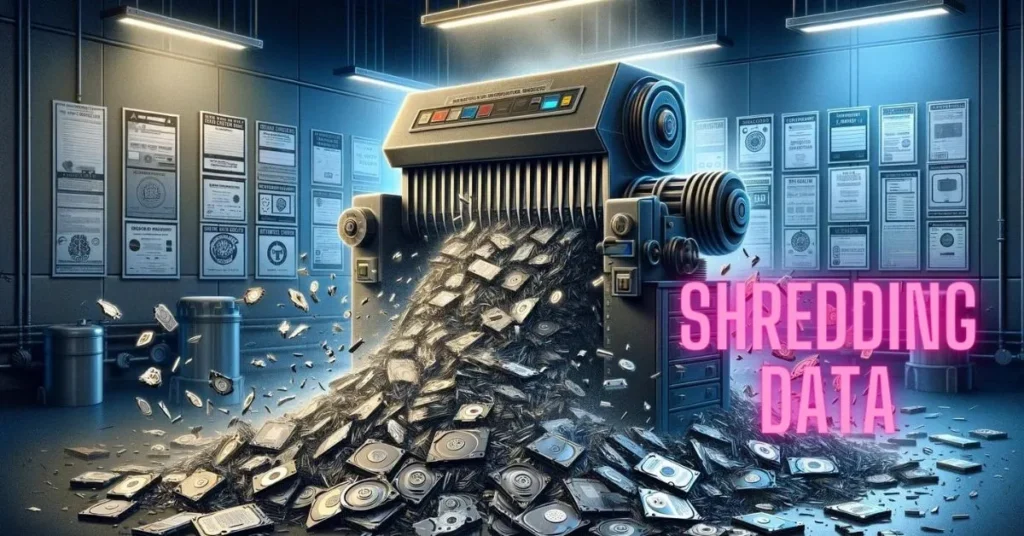In the present scenario of digital domination, information is king. The hard drives hold a treasure trove of sensitive data, from personal financial records to confidential business documents. But what happens to this data when you’re done with it? Simply hitting “delete” might seem enough, but it’s a digital game of hide-and-seek. Deleted data often remains recoverable by tech-savvy individuals with the right tools. This is where you need to destroy hard drive offering an ironclad solution for permanent data destruction.
Contents
Why Deleting Isn’t Enough: Understanding Data Remnants
Now, dive deeper into why relying solely on deletion is a risky proposition. When you delete a file, you instruct your computer to remove the directory referencing its location on the hard drive. The data isn’t truly erased; it becomes invisible to the operating system. With data recovery software readily available, determined individuals can potentially resurrect those seemingly deleted files.
This vulnerability is further amplified by the way hard drives store information. Data is written magnetically onto the drive’s platters. Deleting a file doesn’t overwrite this magnetic inscription; it merely marks the space available for new data. Until new information is written over the deleted file, it remains vulnerable to recovery efforts.
The Shredding Advantage: Physical Destruction for Peace of Mind:
Here’s where hard drive shredding comes to the rescue. Shredding companies employ industrial-grade machines that physically disintegrate hard drives. These machines can pulverize drives into tiny particles, bend and twist them into unrecognizable shapes, or even reduce them to dust. This physical destruction ensures that the magnetic data storage medium is rendered completely unusable, eliminating any possibility of data recovery.
The benefits of hard drive shredding extend far beyond safeguarding sensitive information. Here are some compelling reasons to consider shredding your old drives:
Compliance with Data Privacy Regulations: A growing number of data privacy regulations, like GDPR (General Data Protection Regulation) in the EU, mandate organizations to implement appropriate data security measures when disposing of electronic devices. Shredding demonstrably fulfills these compliance requirements.
Identity Theft Protection: With identity theft on the rise, protecting your data is paramount. Shredding personal hard drives containing financial information, social security numbers, or medical records eliminates the risk of this information falling into the wrong hands.
Environmental Responsibility: While some shredding companies offer data wiping services alongside shredding, shredding is often the more ecologically friendly option. Wiping requires powering on the drives, which consumes electricity. Shredding, on the other hand, offers a more definitive and energy-efficient solution.
Choosing the Right Shredding Service: What to Look For
Now that you understand the importance of hard drive shredding, here are some key factors to consider when selecting a shredding service provider:
Security Certifications: Ensure the company adheres to industry-recognized data security standards. Look for certifications like NAID (National Association for Information Destruction) or R2 (Responsible Recycling) demonstrating their commitment to secure data destruction practices.
Shredding Methods: Inquire about the specific shredding methods employed. Different shred sizes offer varying levels of security. Smaller particle sizes generally offer greater protection.
Witnessing Options: Some shredding companies allow you to witness the shredding process firsthand, providing an extra layer of assurance.
Environmental Practices: Look for a company that prioritizes environmentally responsible practices. Ideally, they should have a system for recycling any non-data-bearing components of the shredded hard drives.
Shredding vs. Degaussing: Understanding the Differences
Degaussing is another method used for data destruction. It involves exposing the hard drive to a powerful magnetic field that scrambles the stored data. While degaussing can sometimes be effective, it’s not as foolproof as shredding. Degaussing may not be entirely successful on all drives, and it can damage certain types of hard drives. Moreover, degaussed drives often require physical destruction afterwards to ensure complete data eradication.
The Bottom Line: Shredding – Your Ultimate Defense
In the digital scenario, data security is not an option; it’s a necessity. When it comes to permanent data destruction, hard drive shredding stands out as the most reliable and secure solution. Choosing a reputable shredding service provider can ensure your sensitive information is rendered irretrievably destroyed, offering peace of mind and safeguarding your privacy.
Remember, destroy the hard drive, not just to protect your data but to safeguard your identity. It ensures compliance with regulations and even contributes to a greener tomorrow. So, the next time you discard a hard drive, don’t settle for a simple “delete.” Opt for the ultimate defense – get it shredded.











